Papers by Djossou K Alfred
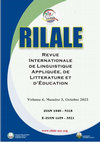
RILALE, 2023
The political decolonization of Africa in the period of independence has soon bumped on a crucial... more The political decolonization of Africa in the period of independence has soon bumped on a crucial obstacle on the way: the question of the language in postcolonial African literatures. In this regard, several well-known writers and essayists such as Ngũgĩ, Fanon, and Kunene have offered their approach to this question and expressed their full support for the production of texts in African languages as the way to mind liberation. The promotion of mother tongues is proposed by Ngũgĩ in his book Decolonizing the Mind: the Politics of Language in African Literature (1986) to analyze and sustain the paradigm change. However, the question remains delicate given to the fact that the multilingual meaning of literatures expressed in a foreign language in Africa constitutes a diversity and a strength assumed by other writers. The question of the language in postcolonial African literatures is answered here with a Marxist perspective to reveal and preserve the quality, the influence and the international reputation of the African authentic creation.
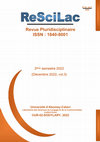
Djossou K. Alfred, 2022
The present paper examines the African women’s powers promotion system as described in three insp... more The present paper examines the African women’s powers promotion system as described in three inspiring novels by male writers. It highlights the real positions of women in African societies far from their common degrading roles wrongly assigned in some male writings. This is done through a critical analysis of the novels, Things Fall Apart (1958), Petals of Blood (1986) and A Wreath for Udomo (1956), all classics. In these novels, women are portrayed in some ways, so that self-aware of their powers, knowledgeable persons, skilled and spiritually ordained to have their words reckoned in their community with no haughtiness. Based on the natural powers of women in African societies depicted in the novels, the paper tries to demonstrate the pivotal roles of women, by the help of theories like postcolonial, feminism and psychoanalysis, contrary to the general lens women have been heard, seen and perceived.
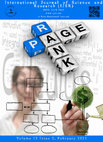
Théophile Houndjo; Djossou K. Alfred, 2022
This article aims at showing that Africans are as responsible as Europeans for the enslavement o... more This article aims at showing that Africans are as responsible as Europeans for the enslavement of the men and women during that period through a work of fiction. For one thing, despite the abolition of slave trade, African Kings/Queens, monarchs, nobles and families, just to name only a few people, still find it normal to sell their kinsmen to others. For another thing, other Africans, owing to their needs and mentality, buy and own slaves in order to use them without any pay, thus depriving them of all human rights. The results are heart-breaking: slave dealers forget about the slaves after receiving their price, while slave buyers and owners ill-treat slaves in such a way that they are regarded as nothing. We have used the sociological methodology to show how deeply the phenomenon of slavery is rooted in the Ibo and African community before the Europeans could set foot in Africa. We have also used the quantitative and qualitative methods.

The main trust of the present essay is to find out the reasons why military coups have frequently... more The main trust of the present essay is to find out the reasons why military coups have frequently occurred in newly independent African countries and why the regimes have failed parceling the state and fallen in the same evils they pretend to decipher. This way, Africa continues to be subjected to regular military coups and civilian political maneuvering and economic gambling. Dealing filthiness in politics and violence to maintain power, Achebe and Ngugi’s merit is to have predicted the phenomenon getting ready to outbreak. Achebe and Ngugi have played a full role of novelist as teacher raising alarm on the necessity to change the prevalent paradigm. Focusing on sub-Saharan Africa, a region prone to both internal and large-scale political upheavals at the time of the novels’ publication, the essay confirms the link between military power and violence as well as the personalization of power by civilians and violence. Throughout both narratives, theories like that of Fanon and Mbembe have helped us disentangle the process which leads African elites and men in uniforms to jeopardize their countries’ economic development, so that it lingers behind today.
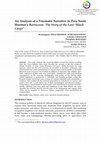
Koumagnon Alfred DJOSSOU, 2022
This essay analyses the recurring debate around the trauma resulting from the TransAtlantic slave... more This essay analyses the recurring debate around the trauma resulting from the TransAtlantic slave trade through the account of the last enslaved, Oluale Kossola, in Zora Neale Hurston's Barracoon (2018). It tracks the long itinerary taken by the evil caravans as revealed in Kossola's testimony and demonstrates the active participation of African peers and monarchs in the trade that took place for years and resulted in millions of deported. The Atlantic slave trade organized to that scale was particularly mischievous with long-standing consequences on the economy, demography and politics of the African states which organized or underwent it. Naturally and innately resilient, exiled like Kossola created and found ways to keep on surface culturally and emotionally, a resiliency that enabled all the enslaved population of Africatown to survive and create a new life, a new Africa out of their psychological and physical distress. Using Fanon's psychoanalysis and Caruth's new historicism to examine Kossola's mental suffering from loss, grief and loneliness in the New World, the essay unearths the wounds, horrors and the pain of his kidnapping and capture from Africa as is mapped in Barracoon, before suggesting some possibilities of compensation.
Research on humanities and social sciences, 2015
One of the main issues of African countries after the period of democratization in 90s is the dev... more One of the main issues of African countries after the period of democratization in 90s is the development of big cities which leads to street-involved children. Through this paper, Ipropose to conduct an analysis of (1)the strategies implemented so far by Amma Darko in her fiction to emphasize and draw attention on that serious (2) and growing phenomenon through her characters Fofo, Odarley, Baby T. She then gives way to her imagination by (3) suggesting means such as the alternative library to strengthen monitoring and caring centers of children in the intervention of Accra and its suburb areas. Keywords : street-child, youth, monitoring, caring centers.
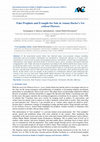
International Journal on Studies in English Language and Literature, 2018
This phenomenon of "new prophets" is a poverty-related social predicament. The "New prophets" spr... more This phenomenon of "new prophets" is a poverty-related social predicament. The "New prophets" sprout, spread and proliferate along with crisis outbreak in the country. They mushroom like vegetables in the rainy season and come in cities with many famous biblical references such as Moses, Joshua, Elijah, Elisha, Jeremiah, Isaiah, Zechariah or Abednego. The so-called "men of God" go to markets, radio stations, television, hospitals and other public places, distribute flyers in buses and in cars to communicate with the population. They gather people through movies and evangelize them. They try to persuade people by all means to believe them. Their strategies are used to gain followers for their weekly masses and then use these followers as their own machine of fortune. The Nigerian satirist and drama writer Wole Soyinka had already denounced it in his The Trials of Brother Jero in 1964. In this play, Soyinka portrays Brother Jeroboam as a self-proclaimed prophet
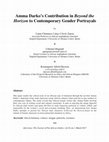
The Journal of Pan-African Studies, 2017
IntroductionKnowledgeable observers rightly and rightfully believe that early African fiction rel... more IntroductionKnowledgeable observers rightly and rightfully believe that early African fiction relegates female characters to a position of secondary importance. Indeed, African male authors purposely do not write accurately from female perspective or do not (re) present feminist ideals because they have a different view about female experience. As Achebe justifies the writing of Things Fall Apart, arguing that African pre-colonial history must be written by African people to avoid distortions (Booker, 1988: 65). The same reality can well be applied to women. Most of the time, life from the female point of view should be portrayed in literature by women authors, but male authors have also taken on the female perspective. While writing about women, it is possible that male writers describe female characters differently depending on gender, nationality, mood and culture. To set things right, African female intellectuals took to their pens to say what the different components of the tra...
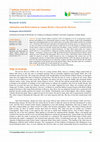
In every human relation everyone"s will is to dominate or to be in possession of power. Reason an... more In every human relation everyone"s will is to dominate or to be in possession of power. Reason and intelligence are systematically denied to women. This tendency results in the subordination, oppression and marginalization of a class (often male) over another (often female) and that of a colonizer over a colonized. Social hierarchy determines the perpetuation of human species as organized by men. As men carve all the social rules in their benefit, women have to live in the margin as secondary citizens. In that context, women are eternally assisted with surveillance as their existence is associated with the stereotype of women"s capacity to control themselves. As Mary Ellen Lamp points out "women"s speech, like Eve"s, was pervaded by a dangerous sexuality requiring strict containment to prevent moral damage". Fortunately, writing occurs to split up all that division by giving proof-based evidence and by mixing up voices, identities and assignations. This is why in Africa, some female writers use their prose, replete of narratives of power control between the two, to demonstrate that women also can. By considering the narrative of Amma Darko in Beyond the Horizon (1995), the purpose of this paper is to show how the major protagonist tries to confront her weakness and then reinvent herself, but not without great consequences on her psyches and on her physical future. More, this paper maps out a colonizer"s body sacrifice who finally tries to fence bitterly her way to liberty.
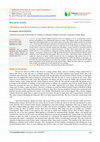
Indiana Journal of Arts and Literature Abbriviate Tittle-Ind J Arts Lite, 2020
In every human relation everyone"s will is to dominate or to be in possession of power. Reason an... more In every human relation everyone"s will is to dominate or to be in possession of power. Reason and intelligence are systematically denied to women. This tendency results in the subordination, oppression and marginalization of a class (often male) over another (often female) and that of a colonizer over a colonized. Social hierarchy determines the perpetuation of human species as organized by men. As men carve all the social rules in their benefit, women have to live in the margin as secondary citizens. In that context, women are eternally assisted with surveillance as their existence is associated with the stereotype of women"s capacity to control themselves. As Mary Ellen Lamp points out "women"s speech, like Eve"s, was pervaded by a dangerous sexuality requiring strict containment to prevent moral damage". Fortunately, writing occurs to split up all that division by giving proof-based evidence and by mixing up voices, identities and assignations. This is why in Africa, some female writers use their prose, replete of narratives of power control between the two, to demonstrate that women also can. By considering the narrative of Amma Darko in Beyond the Horizon (1995), the purpose of this paper is to show how the major protagonist tries to confront her weakness and then reinvent herself, but not without great consequences on her psyches and on her physical future. More, this paper maps out a colonizer"s body sacrifice who finally tries to fence bitterly her way to liberty.
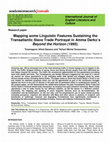
Koumagnon Alfred Djossou, 2019
Centuries ago, Africa witnessed one of the most shocking traffic in human beings ever to happen i... more Centuries ago, Africa witnessed one of the most shocking traffic in human beings ever to happen in the world. The traffic stripped millions of young, brave and strong African people from their land for free labour beyond the horizon. The traffic set commercial opportunities for the perpetrators providing them with wealth and fame. The last decades have seen a rise in literature triggered by the need for a devoir de memoir for future generations. This event has transformed the various literary genres that are conducted by African writers to induce the changing of mind in the descendants-victims and the perpetrators. This is manifested in an approach of revealing the historical event by using contemporary fictional devices. The novel under scrutiny, Amma Darko’s Beyond the Horizon (1995) narrates in a special way the Transatlantic Slave Trade that has been the concern of a whole country in terms of trauma embodied in characters in post-colonial female writing.
The paper seeks to analyse the interest of contemporary African female writers to map in the ghosts of the Transatlantic Slave Trade which has provoked the prevailing poverty in Africa for centuries. The focus of this paper is to examine how Amma Darko uses fiction to map that shameful and horrible trade named triangular slave trade or Transatlantic Slave Trade.
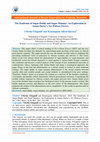
This paper offers a critical reading of Not without flowers (2007) and the way Amma Darko develop... more This paper offers a critical reading of Not without flowers (2007) and the way Amma Darko develops her thematic by representing many growing social issues in African postcolonial countries. The paper unveils the way the female novelist seeks to challenge the prevailing traditional views of patriarchy in African societies and subverts it. She writes about social evils among which the phenomenon of sugar-daddies or sugar-mummies and insidiously invites her female characters to stand against it. Amma Darko sharply condemns this syndrome and favours a critical analysis of the concept of new motherhood especially in contemporary Africa. Agreeing with Amma Darko and using a sociological approach, the paper brings to the fore this phenomenon as a serious reality to reckon in male dominant settings. The sugar daddy or sugar mummy phenomenon is the sexual relation between usually older and wealthy people and young students or unemployed from poor settings. Therefore, Darko‟s desire is to project the woman as a survivor of the harshest conditions, vicissitudes and hurdles which characterise African postcolonial existence. Considering the terrible ordeals imposed on African women, this paper uncovers how Amma Darko gives way to her feminist ideas to project her ideological stance in the present creative writing. She finally indicates poverty and illiteracy as the root causes of the phenomenon. This paper pinpoints the origins of the phenomenon and its magnitudes on the youth in question and on African community.
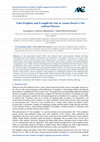
Abstract: In the postcolonial period, Africa has inherited many socio-economic changes including ... more Abstract: In the postcolonial period, Africa has inherited many socio-economic changes including Christianity and its by-products. Christianity was introduced to "brainwash" Africans to no longer resist colonization as well as to put an end to ancient pagan practices. Christianity’s armed wing is evangelization. Unfortunately, some hungry and brash people in search for money, power, greatness and majesty hijacked evangelization’s aim. Today, this form of evangelism is prevailing in the smallest and the most remote corners in all African urban centers. It is alive, vivid, violent, electrifying and demanding. It acts to ''win'' lost souls for Christ, the Savior. Evangelization in the postcolonial Africa claims to work miracles and wants appeal to the poor and left-aside; however bilks them of their properties and promises them spiritual prosperity and heaven. In this article, I give my insights on the position of a contemporary African writer addressing this scourge in her own way and words. Amma Darko bluntly denounces this practice of "new prophets". She spares no detail to disclose these so-called new prophets’ modus operandi. Finally, I show the unfortunate consequences on those who blindly believe in these prophets.
This paper tackles the critical issue of an African type of feminism through the novelist Amma Da... more This paper tackles the critical issue of an African type of feminism through the novelist Amma Darko's depiction of her male characters using African cultural values and day-today realities in contemporary Ghana. The study reveals that African female writers like Amma Darko develop their own way of writing social and cultural constraints. It aims at rejecting the image depicted by African male writers and opens the floor to male characters portrayal as violent, selfish, and responsible for the women's social and economic hardship. Thus, we demonstrate how Amma Darko attempts to present her African male characters in Beyond the Horizon based on the ordeals of female characters in most patriarchal situations in Africa.
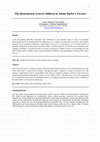
L'une des grandes difficultés auxquelles sont confrontés les pays africains après la vague du pri... more L'une des grandes difficultés auxquelles sont confrontés les pays africains après la vague du printemps démocratique des 90 est le phénomène des enfants de rue. Cet article vient analyser les causes de cette situation dénoncée par la romancière Ghanéenne Amma Darko d'une part, les conséquences sur la société africaine en générale et ghanéenne en particulier d'autre part. Enfin, cet article montre la voie choisie par la romancière pour endiguer le problème : les points d'écoute et de prise en charge de l'enfance à travers ses personnages tels que Fofo, Odarley, Baby T, Kabria, Vikie et autres personnels de MUTE et les présentateurs de Harvest FM comme Sylv Po. Mots clés : enfants de rue, points d'écoute, jeunesse, prise en charge. Abstract: One of the main issues of African countries after the period of democratization in 90s is the development of big cities which leads to street-involved children. Through this paper, I propose to conduct an analysis of (1) the strategies implemented so far by Amma Darko in her fiction to emphasize and draw attention on that serious (2) and growing phenomenon through her characters Fofo, Odarley, Baby T. She then gives way to her imagination by (3) suggesting means such as the alternative library to strengthen monitoring and caring centers of children in the intervention of Accra and its suburb areas. Eine der großen Schwierigkeiten der afrikanischen Länder nach der Welle des demokratischen Frühlings der 90er Jahre ist das Phänomen der Straßenkinder. Dieser Artikel analysiert, einerseits, die Ursachen dieser Situation die von der ghanaischen Romanschriftstellerin Amma Darko angekündigt wurden und andererseits die Folgen auf der afrikanischen Gesellschaft allgemein und besonders der ghanaischen Gesellschaft. Schließlich zeigt dieser Artikel den von der Romanschriftstellerin gewählten Weg, um das Problem einzudämmen: die Abhörpunkte und Unterstützung der Kindheit durch seine Personen solche wie Fofo, Odarley, Baby T, Kabria, Vikie und andere versetzte Personalien und die Präsentatoren von Harvest FM wie Sylv Po.
L'une des grandes difficultés auxquelles sont confrontés les pays africains après la vague du pri... more L'une des grandes difficultés auxquelles sont confrontés les pays africains après la vague du printemps démocratique des 90 est le phénomène des enfants de rue. Cet article vient analyser les causes de cette situation dénoncée par la romancière Ghanéenne Amma Darko d'une part, les conséquences sur la société africaine en générale et ghanéenne en particulier d'autre part. Enfin, cet article montre la voie choisie par la romancière pour endiguer le problème : les points d'écoute et de prise en charge de l'enfance à travers ses personnages tels que Fofo, Odarley, Baby T, Kabria, Vikie et autres personnels de MUTE et les présentateurs de Harvest FM comme Sylv Po.
Books by Djossou K Alfred
Gli articoli sono a firma di docenti della Facoltà di "Sciences de la Santé" dell'Università d'Ab... more Gli articoli sono a firma di docenti della Facoltà di "Sciences de la Santé" dell'Università d'Abomey-Calavi con la quale è in corso un gemellaggio.



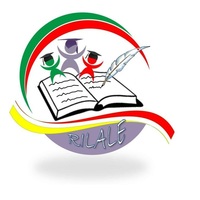






Uploads
Papers by Djossou K Alfred
The paper seeks to analyse the interest of contemporary African female writers to map in the ghosts of the Transatlantic Slave Trade which has provoked the prevailing poverty in Africa for centuries. The focus of this paper is to examine how Amma Darko uses fiction to map that shameful and horrible trade named triangular slave trade or Transatlantic Slave Trade.
Books by Djossou K Alfred
The paper seeks to analyse the interest of contemporary African female writers to map in the ghosts of the Transatlantic Slave Trade which has provoked the prevailing poverty in Africa for centuries. The focus of this paper is to examine how Amma Darko uses fiction to map that shameful and horrible trade named triangular slave trade or Transatlantic Slave Trade.